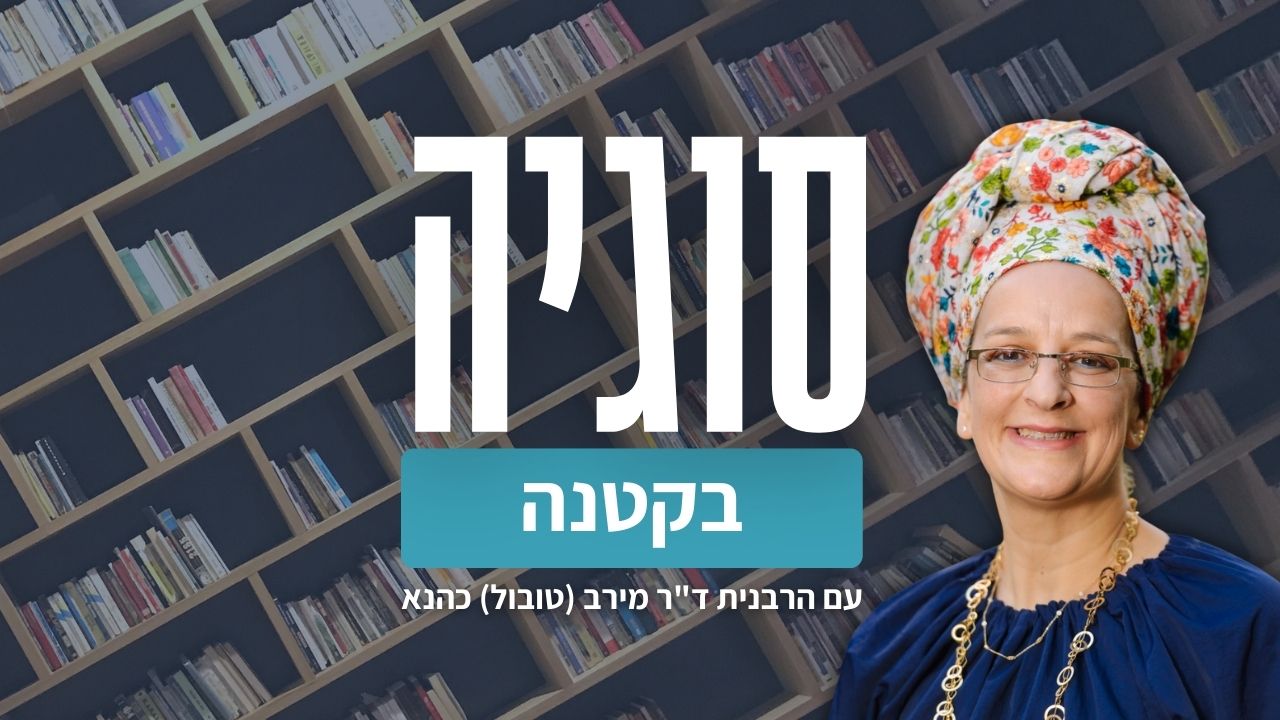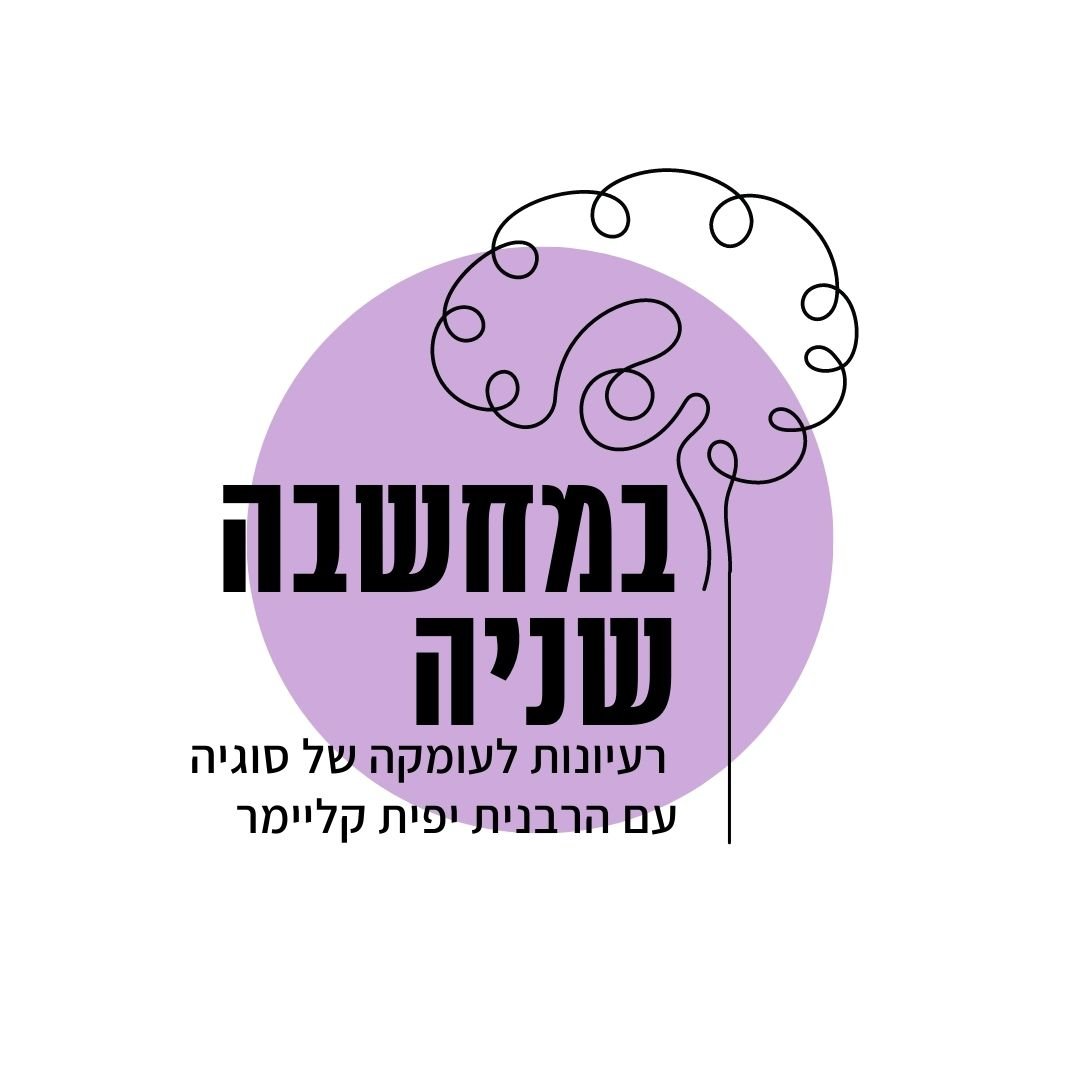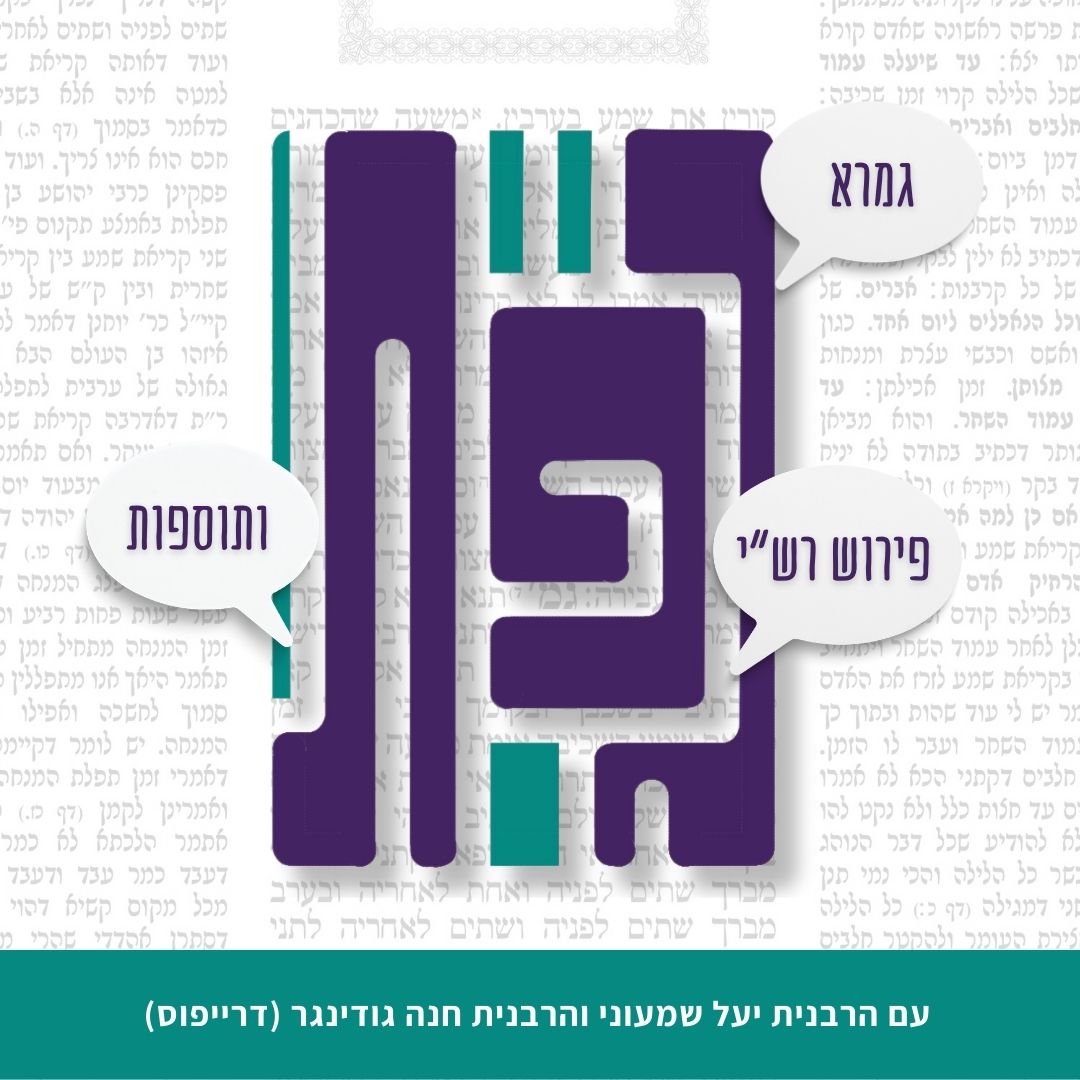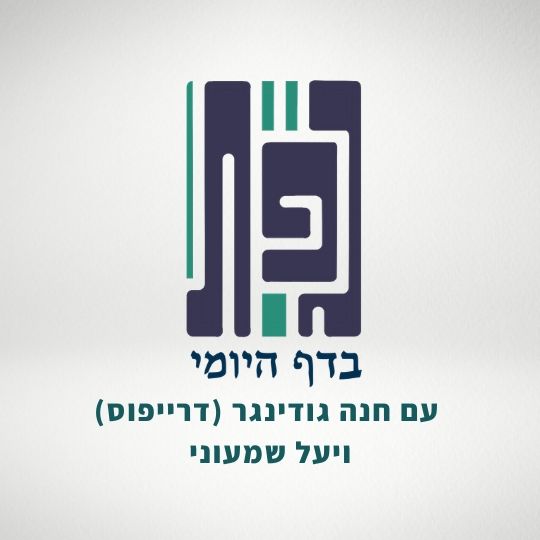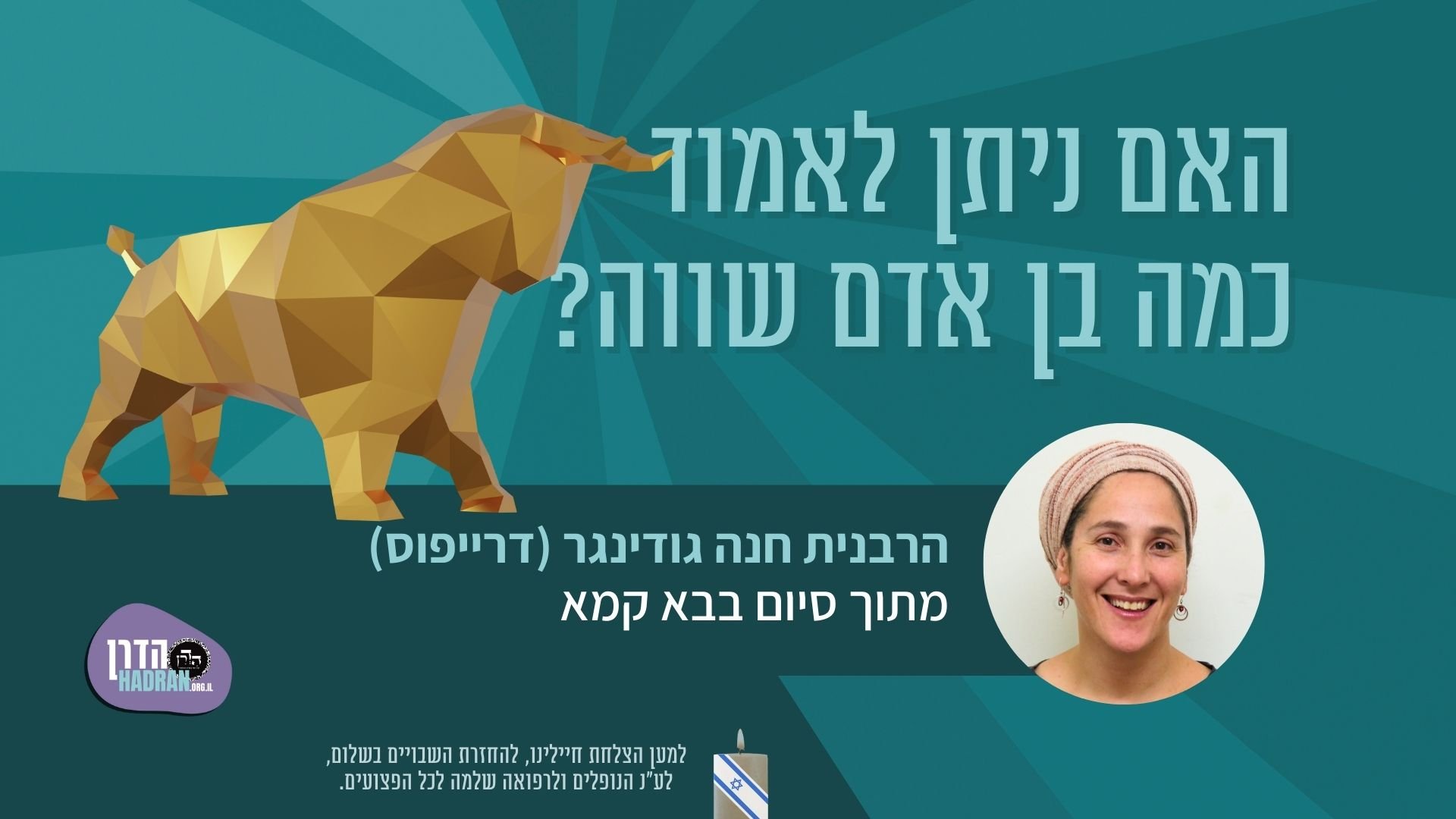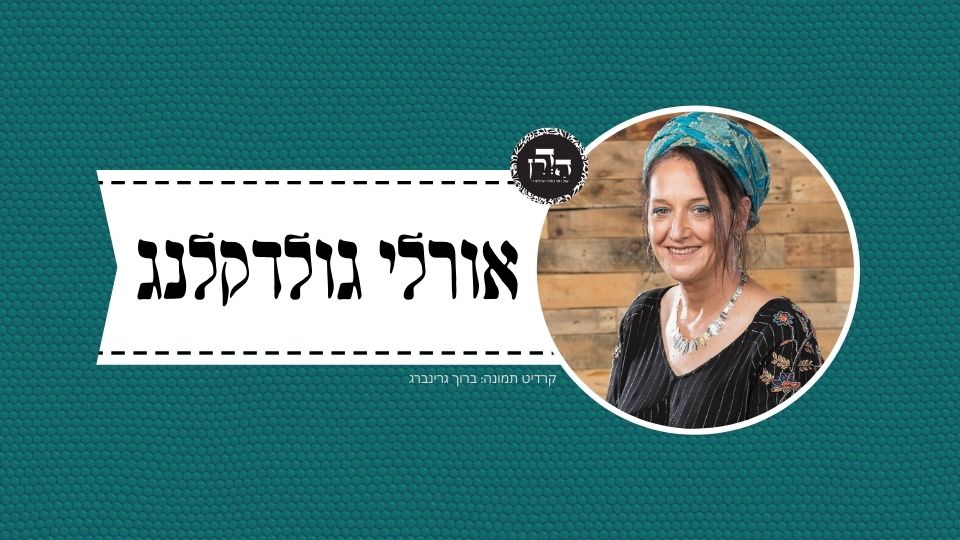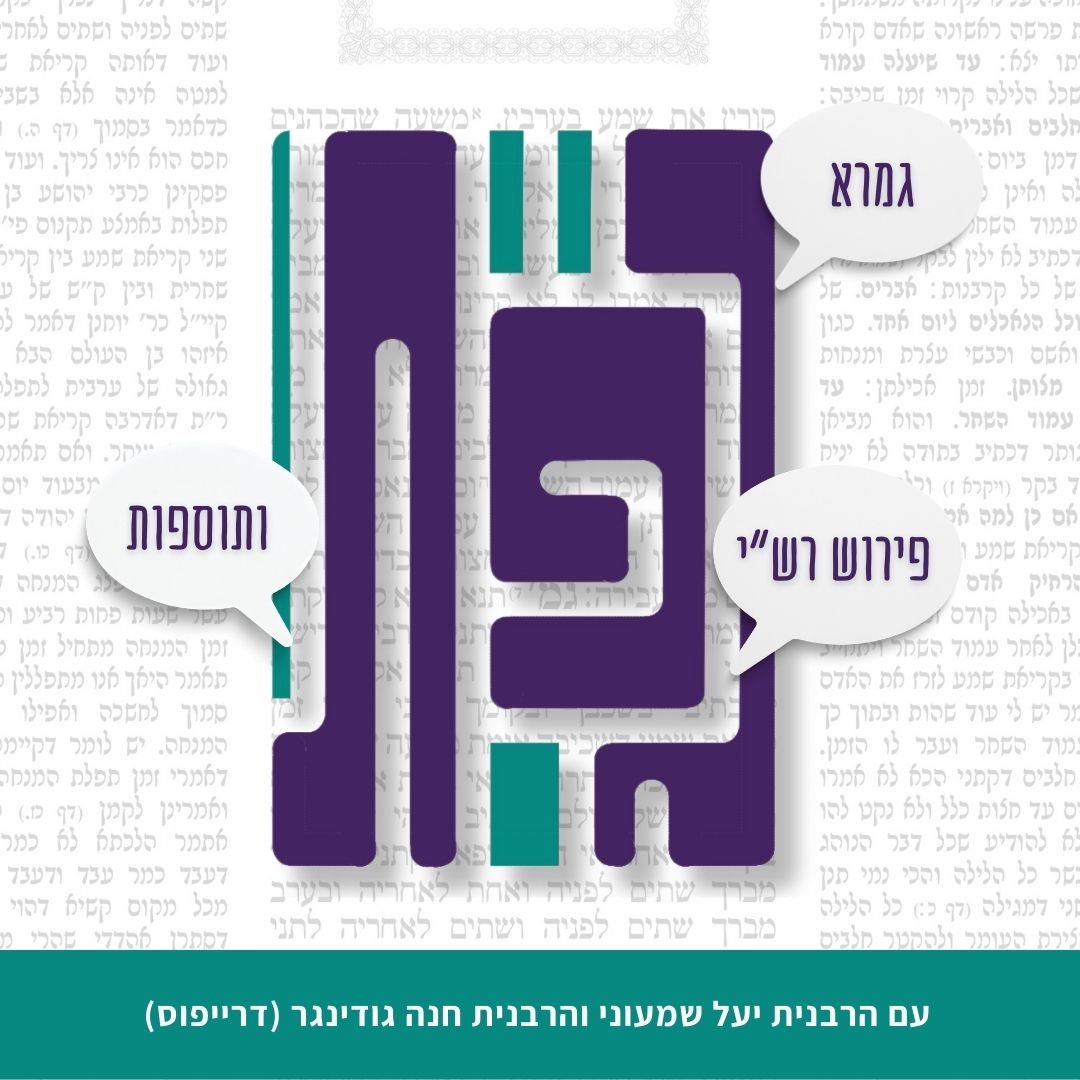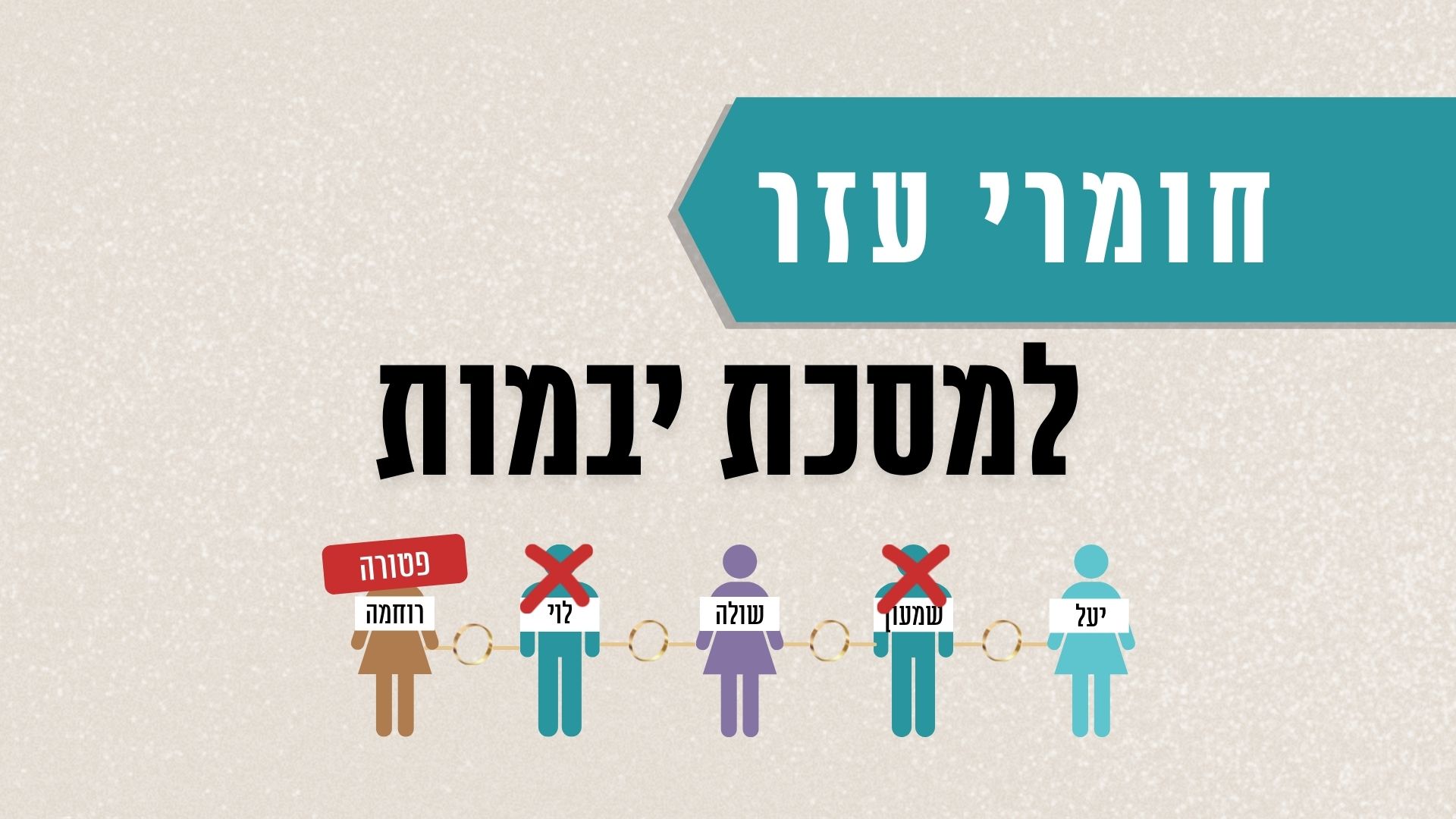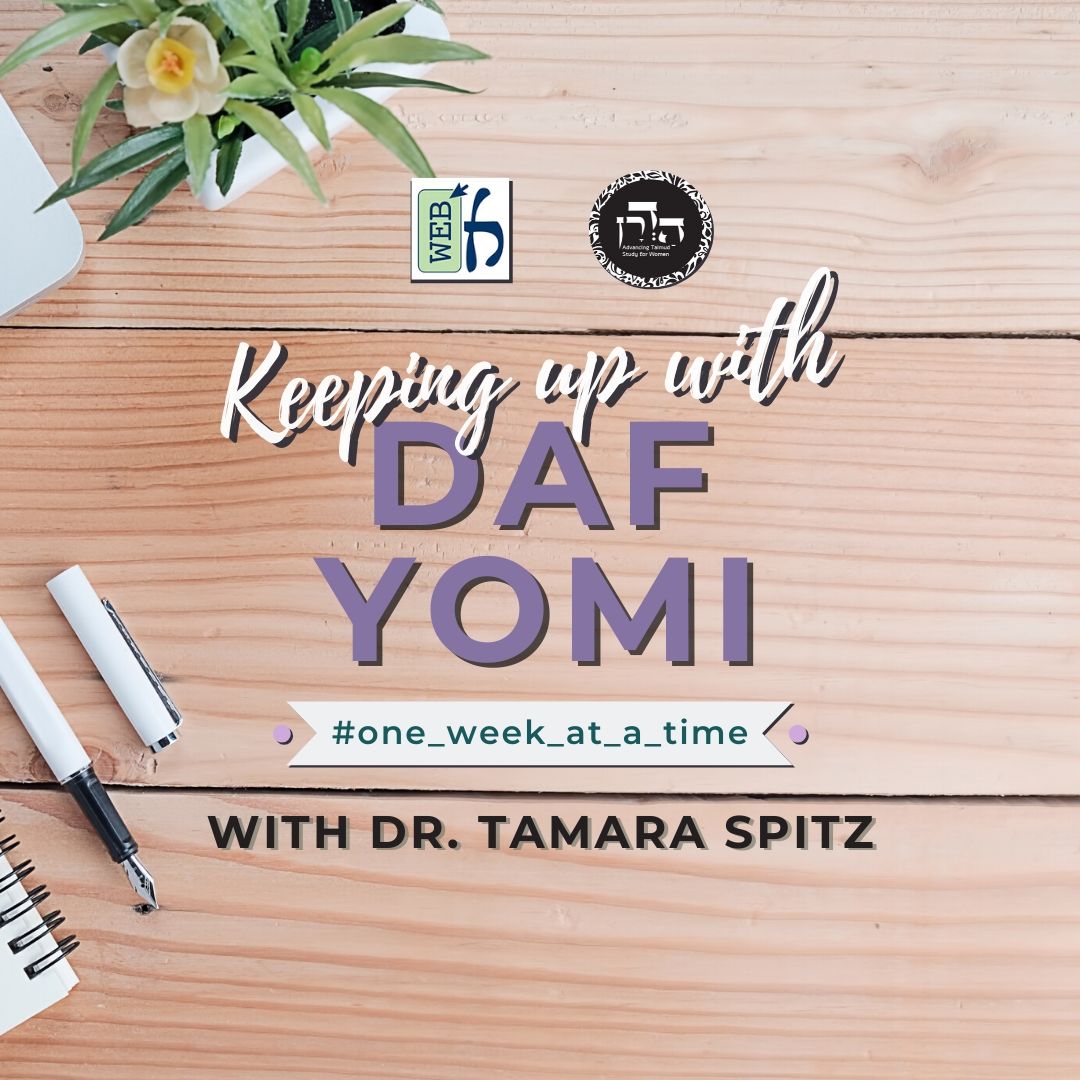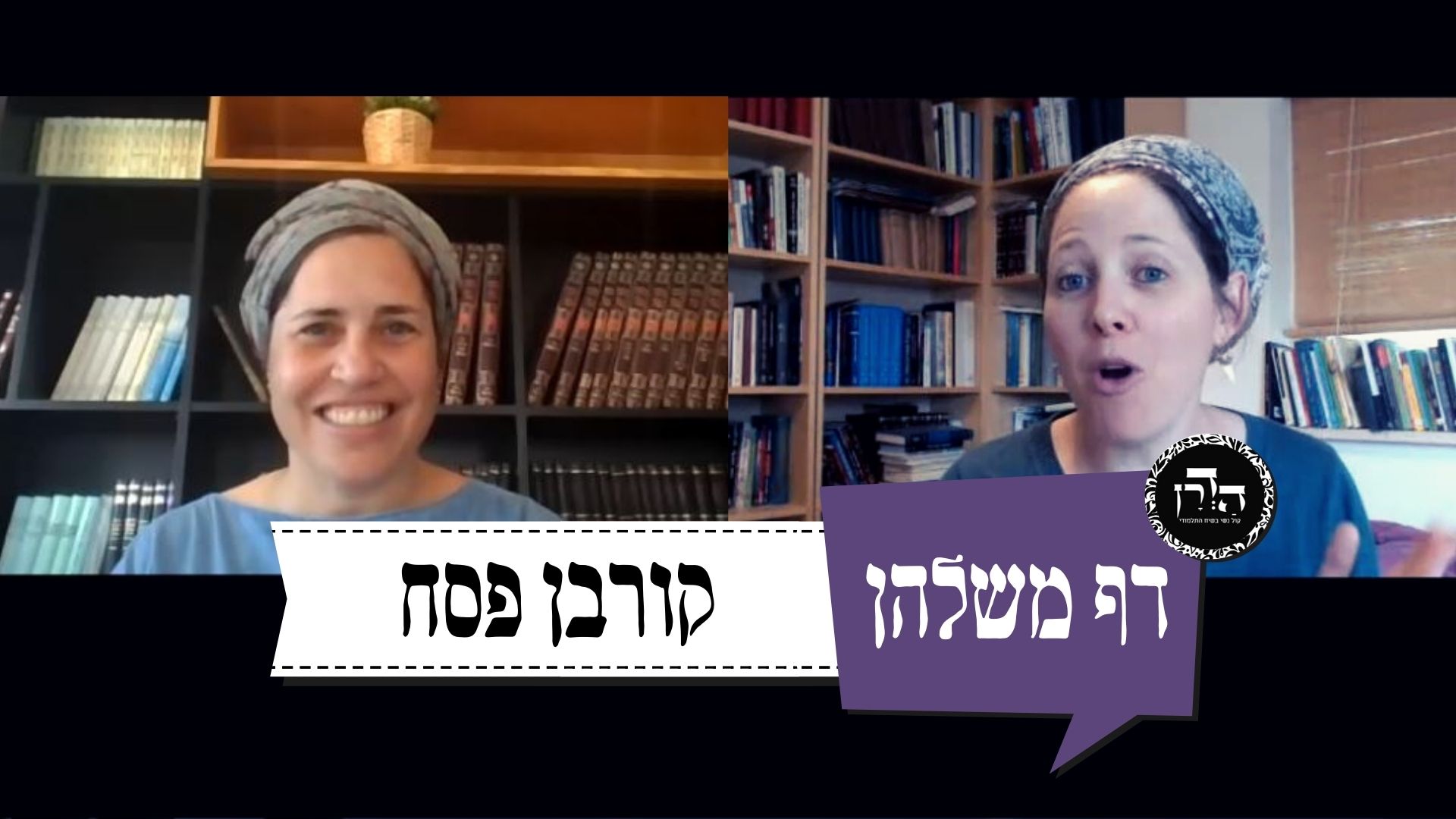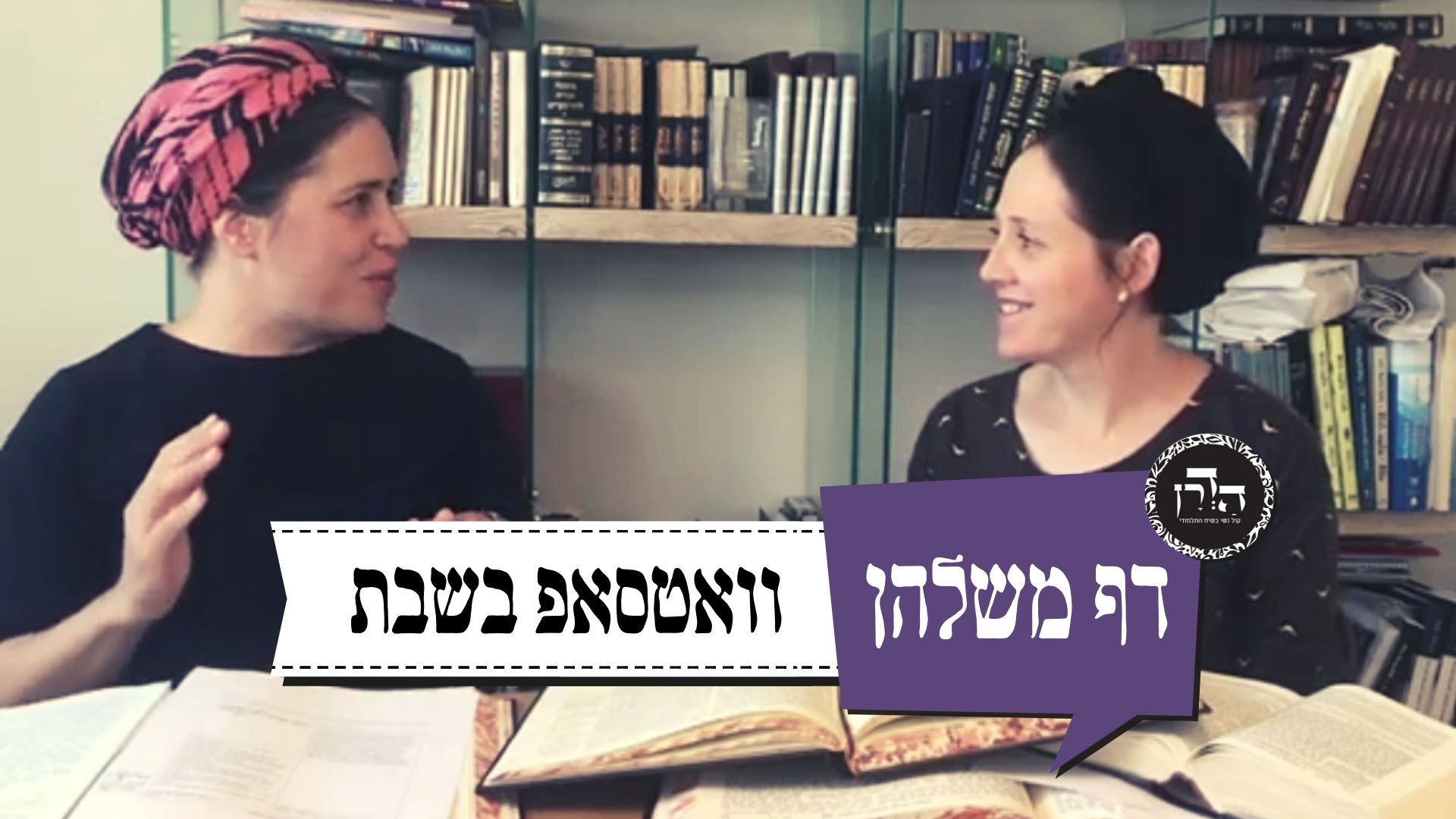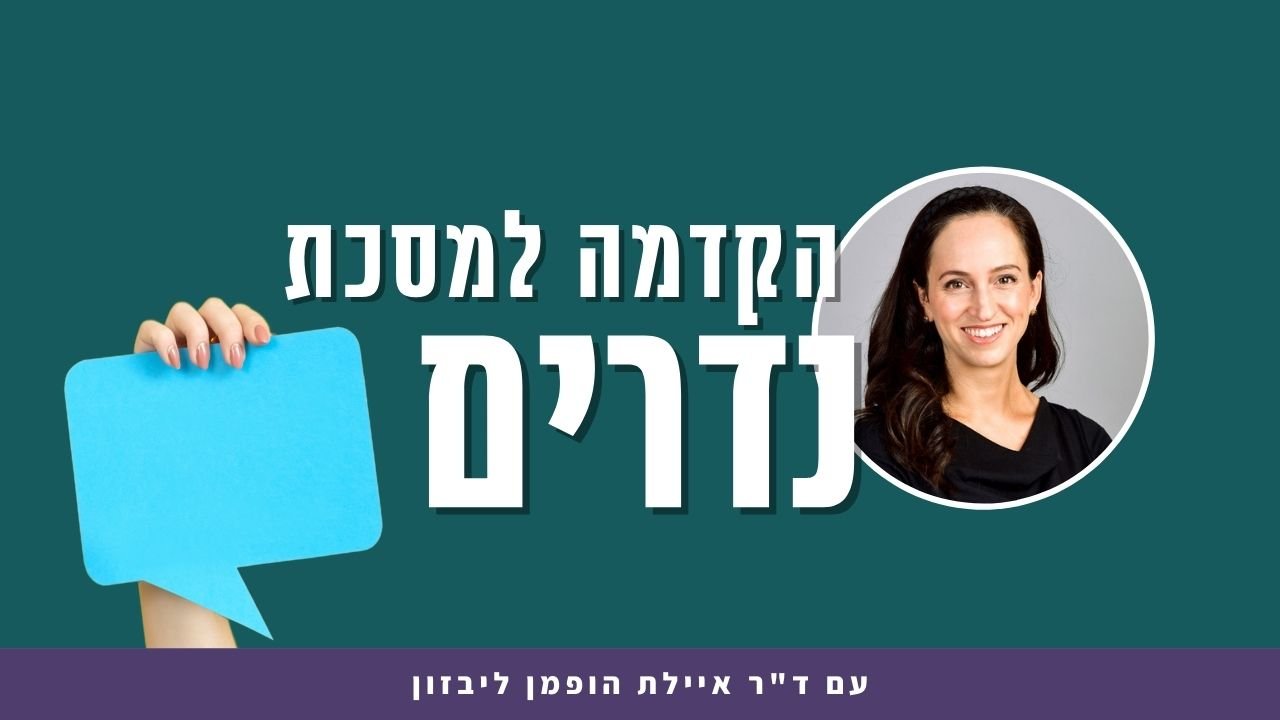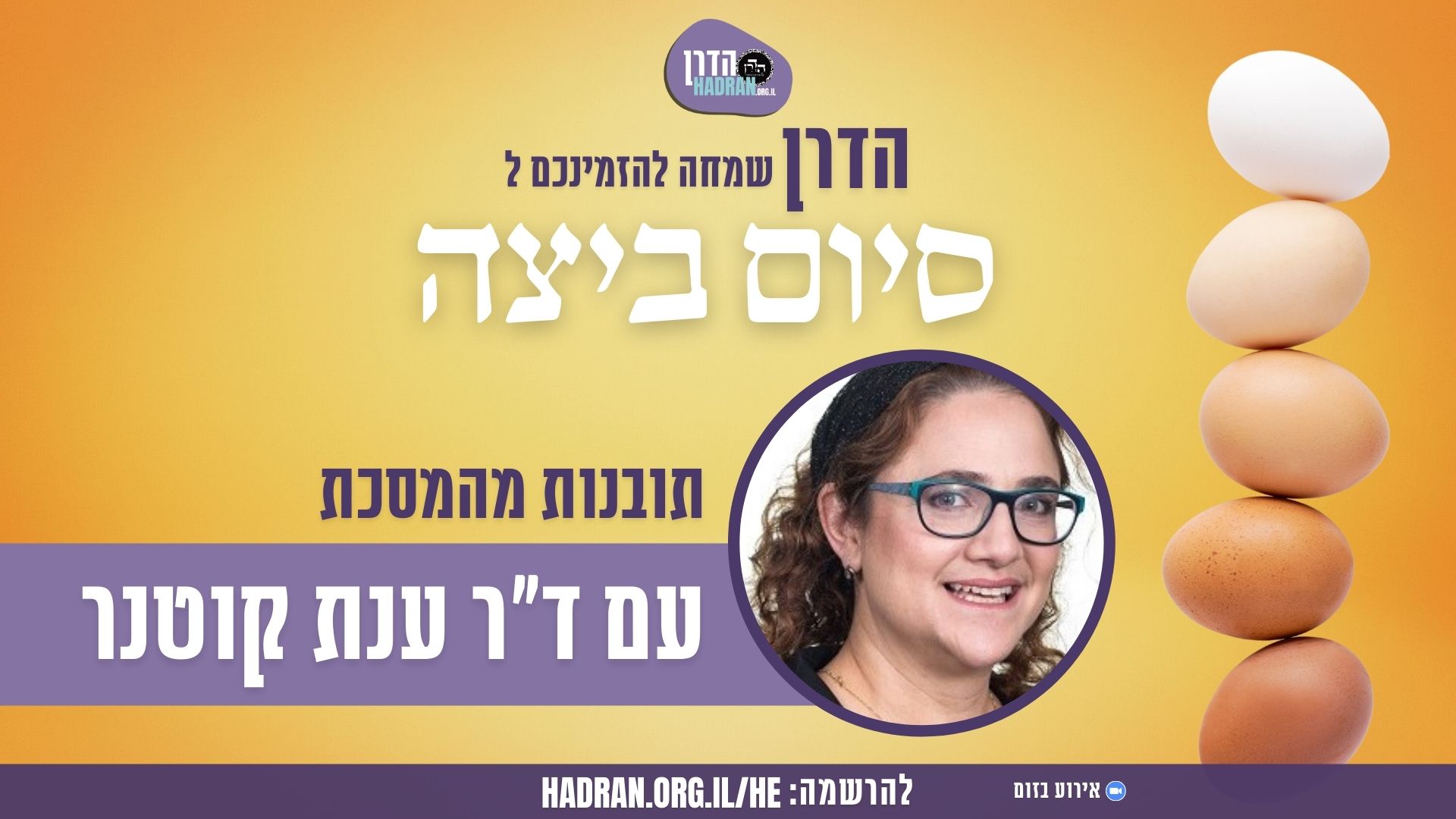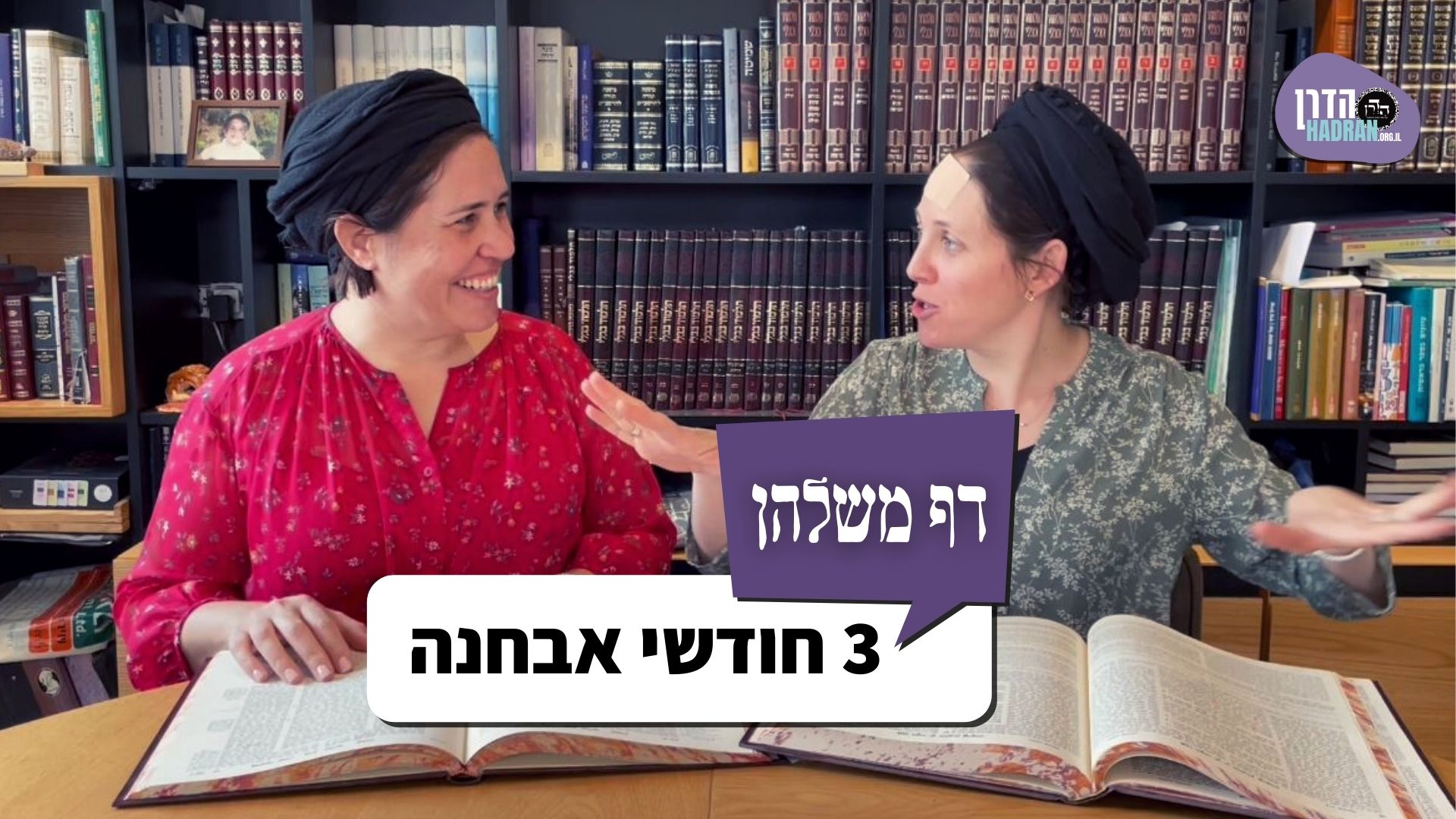אנשי אלכסנדריא שאלו את ר’ יהושע בן חנינא שתים עשרה שאלות מ4 סוגים. הברייתא מביאה את כל השאלות. שני מצורעים שהביאו קרבנותיהם ואחד מת וכבר הקריבו לאחד ולא יודעים של מי. איך השני מקריב קרבנותיו? הם מביאים כמה פסוקים שנראים שסותרים זה את זה – כגון שה’ לא רוצה להמית רשעים ומצד שני הוא כן. עוד שאלות בסגנון – מה לעשות כדי להיות חכם? עשיר? ואז תקפו אותו שמה שאמרו לאו דווקא תואם את המציאות.
רוצה להקדיש שיעור?
כלים
העמקה
רוצה להבין מה באמת קורה מתחת לפני השטח של הסוגיה?
שיעורים, פודקאסטים והרחבות של מיטב המורות שלנו יפתחו לך עוד זוויות וכיווני חשיבה.
חדשה בלימוד הגמרא?
זה הדף הראשון שלך? איזו התרגשות עצומה! יש לנו בדיוק את התכנים והכלים שיעזרו לך לעשות את הצעדים הראשונים ללמידה בקצב וברמה שלך, כך תוכלי להרגיש בנוח גם בתוך הסוגיות המורכבות ומאתגרות.
פסיפס הלומדות שלנו
גלי את קהילת הלומדות שלנו, מגוון נשים, רקעים וסיפורים. כולן חלק מתנועה ומסע מרגש ועוצמתי.
נדה ע
הִיא תּוֹעֵבָה וְאֵין בָּנֶיהָ תּוֹעֲבִין.
With regard to one who remarries his divorced wife, the Torah states: “Her former husband, who sent her away, may not take her again to be his wife, after she is defiled, for that is an abomination before the Lord; and you shall not cause the land to sin, which the Lord your God gives you for an inheritance” (Deuteronomy 24:4). By inference, she, the divorced wife, is an abomination, but her children are not abominations. In other words, if he transgressed the prohibition and remarried this woman, the daughters from that marriage are not disqualified from marrying priests.
שְׁנֵי מְצוֹרָעִין שֶׁנִּתְעָרְבוּ קׇרְבְּנוֹתֵיהֶן זֶה בָּזֶה, וְקָרַב קׇרְבָּנוֹ שֶׁל אֶחָד מֵהֶן, וּמֵת אֶחָד מֵהֶן — הַשֵּׁנִי מַה תְּהֵא עָלָיו?
The third question was as follows: Two wealthy people who were lepers came to purify themselves and each brought a sin offering, a guilt offering, and a burnt offering. Their offerings became intermingled with each other, and the offering of one of them was sacrificed, and subsequently one of them died. What shall be with the second individual, i.e., how can he complete his purification process? If the other one had not died, they could both bring the remaining offering with the stipulation that it should be sacrificed on behalf of whoever is the owner. But now that one is dead, the other person may not bring the remaining animal, as one may not sacrifice a sin offering for one who is dead. He may also not bring another animal instead, as the animal that was already sacrificed might have been his, and one may not bring a second sin offering.
אָמַר לָהֶן: כּוֹתֵב נְכָסָיו לַאֲחֵרִים, וְהָוֵי עָנִי, וּמֵבִיא חַטַּאת הָעוֹף הַבָּא עַל הַסָּפֵק.
Rabbi Yehoshua said to them: The solution is for him to write a contract giving all his possessions to others, whom he trusts to return them as a gift later, and he is then considered to be destitute. And as a poor leper, he brings a bird sin offering, which can be brought even in a case of uncertainty.
וְהָאִיכָּא אָשָׁם! אָמַר שְׁמוּאֵל: כְּשֶׁקָּרַב אֲשָׁמוֹ.
The Gemara challenges: But there is the guilt offering that a leper must bring, and this must be an animal not a bird, and may not be brought in a case of uncertainty. How can this leper bring his guilt offering? Shmuel says: Rabbi Yehoshua was referring specifically to a case where his guilt offering had already been sacrificed, before the animals became intermingled.
אָמַר רַב שֵׁשֶׁת: גַּבְרָא רַבָּה כִּשְׁמוּאֵל לֵימָא כִּי הַאי מִילְּתָא? כְּמַאן? אִי כְּרַבִּי יְהוּדָה, דְּאָמַר: ״אָשָׁם קָבַעה״, וְכֵיוָן דְּקָבַעה לֵהּ אָשָׁם בַּעֲשִׁירוּת — לָא מָצֵי מַיְיתֵי חַטָּאת בְּדַלּוּת.
Rav Sheshet said: Is it possible that a great man like Shmuel would say a statement like this? In accordance with whose opinion does this solution apply? If it is in accordance with the opinion of Rabbi Yehuda, who says that if the leper was wealthy when he sacrificed his guilt offering he has thereby fixed his manner of atonement, and must bring animals as his other two offerings, it is difficult: And once he fixed his guilt offering as an animal while he was wealthy, he may not bring a bird sin offering when he is destitute.
דִּתְנַן: מְצוֹרָע שֶׁהֵבִיא קׇרְבַּן עָנִי וְהֶעֱשִׁיר, אוֹ עָשִׁיר וְהֶעֱנִי — הַכֹּל הוֹלֵךְ אַחַר חַטָּאת, דִּבְרֵי רַבִּי שִׁמְעוֹן.
As we learned in a mishna (Nega’im 14:11): With regard to a leper who brought an offering of a destitute person and thereafter he became wealthy, or if he brought an offering of a wealthy person and thereafter he became destitute, everything follows after the sin offering; this is the statement of Rabbi Shimon. If he was wealthy when he brought the sin offering, he brings the burnt offering of the wealthy; if he was destitute at that time, he brings the burnt offering of the destitute.
וְרַבִּי יְהוּדָה אוֹמֵר: הַכֹּל הוֹלֵךְ אַחַר אָשָׁם. רַבִּי אֱלִיעֶזֶר בֶּן יַעֲקֹב אוֹמֵר: הַכֹּל הוֹלֵךְ אַחַר צִפֳּורִים.
And Rabbi Yehuda says: Everything, i.e., the sin offering and the burnt offering, follows after his status at the time that his guilt offering was brought. Rabbi Eliezer ben Ya’akov says: Everything follows after the offering of the birds, brought seven days earlier, at the start of his purification process.
וְאִי כְּרַבִּי שִׁמְעוֹן, דְּאָמַר: חַטָּאת קָבְעָה, אַף עַל גַּב דְּלָא קְרַב אָשָׁם — נַיְתֵי אַחֵר, דְּהָא שָׁמְעִינַן לֵיהּ לְרַבִּי שִׁמְעוֹן דְּאָמַר: לַיְיתֵי וְלִתְנֵי.
Rav Sheshet continues: And if Rabbi Yehoshua’s statement is in accordance with the opinion of Rabbi Shimon, who said that the sin offering fixed the status of the remaining offerings, it is difficult: Why did Shmuel state that the case is where his guilt offering had already been sacrificed? Even if the guilt offering had not been sacrificed before the animals became intermingled, let him bring another animal as his guilt offering, and stipulate that if the guilt offering that was already slaughtered was his, this animal should be a peace offering. As we have heard that Rabbi Shimon said: Let him bring another animal and stipulate with regard to it.
דְּתַנְיָא, אָמַר רַבִּי שִׁמְעוֹן: לַמׇּחֳרָת מֵבִיא אֲשָׁמוֹ וְלוּגּוֹ עִמּוֹ, וּמַעֲמִידוֹ בְּשַׁעַר נִיקָנוֹר, וּמַתְנֶה עָלָיו וְאוֹמֵר: אִם מְצוֹרָע הוּא — הֲרֵי אֲשָׁמוֹ וְלוּגּוֹ עִמּוֹ, וְאִם לָאו — אָשָׁם זֶה יְהֵא שַׁלְמֵי נְדָבָה.
As it is taught in a baraita that Rabbi Shimon says, with regard to a leper of uncertain status who must bring a guilt offering and a log of oil for his purification: The following day, on the eighth day of his purification, he brings his guilt offering and his log of oil with it, and the priest stands him at the Gate of Nicanor, and the leper stipulates with regard to the offering and says: If this person, i.e., I, was a leper, this is his guilt offering and this is his log of oil with it. And if not, this animal that I brought for a guilt offering shall be a voluntary peace offering, as the two offerings are sacrificed in the same manner.
וְאוֹתוֹ אָשָׁם טָעוּן
And that guilt offering of uncertain status requires
שְׁחִיטָתוֹ בַּצָּפוֹן, וְטָעוּן מַתְּנַת בְּהוֹנוֹת, וּסְמִיכָה, וּנְסָכִים, וּתְנוּפָה, וְחָזֶה וָשׁוֹק, וְנֶאֱכָל לְזִכְרֵי כְהוּנָּה לְיוֹם וָלַיְלָה.
that its slaughter must be performed in the north of the Temple courtyard, as in the case of a guilt offering, and it requires placement of the blood on the right thumb and right big toe and right earlobe of the leper, as described in Leviticus 14:14, and it requires placing hands on the head of the animal, and the accompanying wine libations and waving of the breast and thigh, like a peace offering. And it is eaten by males of the priesthood for one day and the following night, like a guilt offering, rather than for two days, like a peace offering.
וְלֹא הוֹדוּ לוֹ חֲכָמִים לְרַבִּי שִׁמְעוֹן, מִפְּנֵי שֶׁמֵּבִיא קָדָשִׁים לְבֵית הַפְּסוּל!
But the Rabbis did not concede to Rabbi Shimon, because they hold that he thereby brings sacrificial animals to a situation where the time that they may be eaten is restricted, thereby increasing the likelihood of disqualification, as it might be a peace offering, which may be eaten for two days and one night.
שְׁמוּאֵל סָבַר לַהּ כְּרַבִּי שִׁמְעוֹן בַּחֲדָא, וּפְלִיג עֲלֵיהּ בַּחֲדָא.
The Gemara answers that Shmuel holds in accordance with the opinion of Rabbi Shimon with regard to one halakha, i.e., that it is not the guilt offering that fixes whether the leper must bring the offerings of a wealthy person or a destitute person, but he disagrees with him with regard to one other halakha, as he does not permit such a stipulation in the case of a guilt offering.
שְׁלֹשָׁה דִּבְרֵי אַגָּדָה: כָּתוּב אֶחָד אוֹמֵר ״כִּי לֹא אֶחְפּוֹץ בְּמוֹת הַמֵּת״, וְכָתוּב אֶחָד אוֹמֵר ״כִּי חָפֵץ ה׳ לַהֲמִיתָם״! כָּאן בְּעוֹשִׂין תְּשׁוּבָה, כָּאן בְּשֶׁאֵין עוֹשִׂין תְּשׁוּבָה.
The Gemara details the three matters of aggada that the sages of Alexandria asked Rabbi Yehoshua. One verse states: “For I have no pleasure in the death of him that dies, says the Lord God; but turn yourselves, and live” (Ezekiel 18:32). And one verse states, with regard to the sons of Eli the High Priest, who did not pay attention to the reproof of their father: “If one man sins against another, God shall judge him; but if a man sins against the Lord, who shall pray for him? But they did not listen to the voice of their father, because the Lord desired to kill them” (I Samuel 2:25). Rabbi Yehoshua replied to them: Here, the verse in Ezekiel is referring to a case where the sinners repent, whereas there, the verse in Samuel is speaking of a case where the sinners do not repent.
כָּתוּב אֶחָד אוֹמֵר: ״כִּי לֹא יִשָּׂא פָנִים וְלֹא יִקַּח שׁוֹחַד״, וְכָתוּב אֶחָד אוֹמֵר: ״יִשָּׂא ה׳ פָּנָיו אֵלֶיךָ״! כָּאן קוֹדֶם גְּזַר דִּין, כָּאן לְאַחַר גְּזַר דִּין.
The sages of Alexandria also asked the following: One verse states: “For the Lord your God, He is God of gods, and Lord of lords, the great God, the mighty, and the awful, Who shows no favor nor takes graft” (Deuteronomy 10:17), and one verse states: “The Lord shall show favor to you and give you peace” (Numbers 6:26). How can this contradiction be resolved? Rabbi Yehoshua replied to them: Here, the verse in Numbers is dealing with the time before one’s sentence is issued, when God shows favor and forgives; there, the verse in Deuteronomy is referring to after the sentence has been issued, when He no longer forgives.
כָּתוּב אֶחָד אוֹמֵר ״כִּי בָחַר ה׳ בְּצִיּוֹן״, וְכָתוּב אֶחָד אוֹמֵר ״כִּי עַל אַפִּי וְעַל חֲמָתִי הָיְתָה הָעִיר הַזֹּאת לְמִן הַיּוֹם אֲשֶׁר בָּנוּ אוֹתָהּ עַד הַיּוֹם הַזֶּה״! כָּאן קוֹדֶם שֶׁנָּשָׂא שְׁלֹמֹה אֶת בַּת פַּרְעֹה, כָּאן לְאַחַר שֶׁנָּשָׂא שְׁלֹמֹה אֶת בַּת פַּרְעֹה.
The sages of Alexandria further asked: One verse states: “For the Lord has chosen Zion; He has desired it for His dwelling place” (Psalms 132:13), and one verse states: “For this city has been to Me a provocation of My anger and of My fury from the day that they built it until this day, so that I should remove it from before My face” (Jeremiah 32:31). Rabbi Yehoshua replied to them: Here, the verse in Psalms is referring to the time before Solomon married Pharaoh’s daughter (see I Kings 3:1), whereas there, the verse in Jeremiah is speaking of the time after Solomon married Pharaoh’s daughter.
שְׁלֹשָׁה דִּבְרֵי בּוּרוּת: אִשְׁתּוֹ שֶׁל לוֹט, מַהוּ שֶׁתְּטַמֵּא? אָמַר לָהֶם: מֵת מְטַמֵּא, וְאֵין נְצִיב מֶלַח מְטַמֵּא.
The Gemara lists the three matters of ignorance that the sages of Alexandria asked Rabbi Yehoshua. What is the halakha with regard to the wife of Lot, who was turned into a pillar of salt as she fled from the city of Sodom (Genesis 19:26), in terms of whether she transmits ritual impurity as a corpse? Rabbi Yehoshua said to them: A corpse transmits ritual impurity, but a pillar of salt, even if it was formerly a person, does not impart ritual impurity.
בֶּן שׁוּנַמִּית, מַהוּ שֶׁיְּטַמֵּא? אָמַר לָהֶן: מֵת מְטַמֵּא, וְאֵין חַי מְטַמֵּא.
The sages of Alexandria also asked Rabbi Yehoshua: What is the halakha with regard to the son of the Shunammite woman, who died and was brought to life by Elisha (II Kings 4:33–36), in terms of whether he transmits ritual impurity as a corpse? Rabbi Yehoshua said to them: A corpse transmits ritual impurity, but a living person does not transmit ritual impurity, even if he had been dead temporarily.
מֵתִים לֶעָתִיד לָבֹא, צְרִיכִין הַזָּאָה שְׁלִישִׁי וּשְׁבִיעִי אוֹ אֵין צְרִיכִין? אָמַר לָהֶן: לִכְשֶׁיִּחְיוּ נֶחְכַּם לָהֶן. אִיכָּא דְאָמְרִי: לִכְשֶׁיָּבֹא מֹשֶׁה רַבֵּינוּ עִמָּהֶם.
The sages of Alexandria also asked Rabbi Yehoshua: With regard to the dead who will be resurrected in the future, will they require sprinkling with ashes of the red heifer on the third and seventh days, like one who is purified after coming into contact with a corpse, or will they not require that sprinkling? Rabbi Yehoshua said to them: When they come to life, we will be clever for them and clarify the halakha. There are those who say that Rabbi Yehoshua said to them: When Moses our teacher comes with them, he will tell us the correct halakha.
שְׁלֹשָׁה דִּבְרֵי דֶּרֶךְ אֶרֶץ, מָה יַעֲשֶׂה אָדָם וְיֶחְכַּם? אָמַר לָהֶן: יַרְבֶּה בִּישִׁיבָה, וִימַעֵט בִּסְחוֹרָה. אָמְרוּ: הַרְבֵּה עָשׂוּ כֵּן, וְלֹא הוֹעִיל לָהֶם! אֶלָּא יְבַקְּשׁוּ רַחֲמִים מִמִּי שֶׁהַחׇכְמָה שֶׁלּוֹ, שֶׁנֶּאֱמַר: ״כִּי ה׳ יִתֵּן חׇכְמָה מִפִּיו דַּעַת וּתְבוּנָה״.
The sages of Alexandria also asked Rabbi Yehoshua three matters of behavior: What should a person do to become wise? Rabbi Yehoshua said to them: He should increase his time spent sitting in the study house and minimize his dealings in merchandise. The sages of Alexandria said to Rabbi Yehoshua: Many people have done so, and it did not help them to acquire wisdom. Rabbi Yehoshua responded: Rather, they should pray for mercy to receive wisdom from the One to Whom wisdom belongs, as it is stated: “For the Lord gives wisdom; out of His mouth comes knowledge and discernment” (Proverbs 2:6).
תָּנֵי רַבִּי חִיָּיא: מָשָׁל לְמֶלֶךְ בָּשָׂר וָדָם שֶׁעָשָׂה סְעוּדָה לַעֲבָדָיו, וּמְשַׁגֵּר לְאוֹהֲבָיו מִמַּה שֶּׁלְּפָנָיו.
With regard to the subject of wisdom, Rabbi Ḥiyya teaches a parable of a flesh-and-blood king who prepared a feast for his servants. The servants eat the food placed before them, but in addition he sends some of the food that is before him to those he loves. Similarly, God sends some of His wisdom to those He loves, as the verse states: “For the Lord gives wisdom.”
מַאי קָא מַשְׁמַע לַן? דְּהָא בְּלָא הָא לָא סַגִּיא.
The Gemara asks: Since the path to wisdom is through prayer, what is Rabbi Yehoshua teaching us when he says that one should increase his time spent sitting and studying? The Gemara answers that Rabbi Yehoshua is teaching that this, prayer, without that, sitting and learning, does not suffice.
מָה יַעֲשֶׂה אָדָם וְיִתְעַשֵּׁר? אָמַר לָהֶן: יַרְבֶּה בִּסְחוֹרָה, וְיִשָּׂא וְיִתֵּן בֶּאֱמוּנָה. אָמְרוּ לוֹ: הַרְבֵּה עָשׂוּ כֵּן, וְלֹא הוֹעִילוּ! אֶלָּא יְבַקֵּשׁ רַחֲמִים מִמִּי שֶׁהָעוֹשֶׁר שֶׁלּוֹ, שֶׁנֶּאֱמַר: ״לִי הַכֶּסֶף וְלִי הַזָּהָב״.
The sages of Alexandria asked: What should a person do to become wealthy? Rabbi Yehoshua said to them: He should increase his time involved in merchandise and conduct his business faithfully. The sages of Alexandria said to Rabbi Yehoshua: Many people have done so, and it did not help them become rich. Rabbi Yehoshua replied: Rather, they should pray for mercy to receive wisdom from the One to Whom wealth belongs, as it is stated: “Mine is the silver, and Mine the gold, says the Lord of hosts” (Haggai 2:8).
מַאי קָא מַשְׁמַע לַן, דְּהָא בְּלָא הָא לָא סַגִּי.
The Gemara asks: Since the path to wealth is through prayer, what is Rabbi Yehoshua teaching us when he says that one should increase his time spent involved in merchandise and conduct his business faithfully? Once again, the Gemara answers: Rabbi Yehoshua is teaching that this, prayer, without that, being involved in honest business, does not suffice.
מָה יַעֲשֶׂה אָדָם וְיִהְיוּ לוֹ בָּנִים זְכָרִים? אָמַר לָהֶם: יִשָּׂא אִשָּׁה הַהוֹגֶנֶת לוֹ,
The sages of Alexandria further asked: What should a person do to have male children? Rabbi Yehoshua said to them: He should marry a woman who is fit for him



